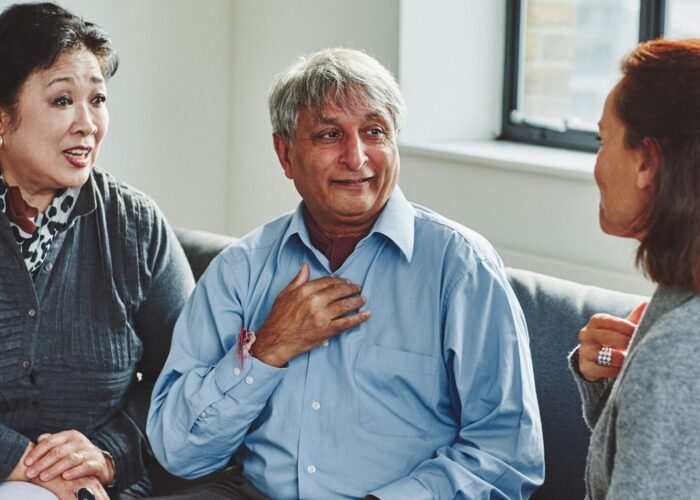 Jess Henderson, ICHP Innovation Delivery Lead, discusses how real world data can be used to generate evidence for digital health…
Jess Henderson, ICHP Innovation Delivery Lead, discusses how real world data can be used to generate evidence for digital health…
(This article first appeared in the Digital Health.London magazine, published at the Digital Therapeutics event on Tuesday 24 April 2018)
We can be fairly confident that the majority of people reading this article own a smart phone and that it now forms a core component of their lifestyle. According to the Office of Life Sciences, 70% of our UK population were using smart phones in 2015 (1) and this figure has already substantially increased.
We use our phones to navigate our way around the country. They enable us to keep in touch daily with the lives of people we care about, select the best restaurants and order takeaways. And increasingly they enable us to communicate with communities of people, we have never, and will never, meet. Our lifestyles have changed substantially since the introduction of the smart phone, and a large proportion of us are now highly dependent on these gadgets.
The NHS, now in its 70th year, has finally started to realise the importance and value attached to the digital health market. There is an understanding that society has evolved, and is both information rich and information hungry. The doctor – patient relationship is gradually starting to shift from a paternalistic one to a partnership model, as patients live longer and start to accumulate more long term conditions which they need to monitor themselves, at home.
We have apps for everything. Don’t know which NHS service to use? There is an app for that. In fact there is a broad church of digital health apps, including apps to manage chronic obstructive pulmonary disease (COPD), to help us stop smoking, to help us lose weight and to track pregnancy. And the sector is expected to expand significantly with CAGR of 35%2 between 2014 and 2018.(2)
NHS Digital has now also developed an evidence-based NHS apps library in recognition that the market is saturated with digital health apps and we need to be utilising the best ones. This is particularly important given that there are now more than 260,000 apps in the digital health market and less than 1% of these have an evidence base.
To support this growing market, academic health science networks (AHSNs) have formed collaborations to ensure that the best digital innovations are supported to be brought to market, an example being the formation of DigitalHealth.London in partnership with MedCity. However whilst these organisations provide a level of guidance around what is good and what isn’t, the universal feedback from users and developers is that there is still a lack of evidence base in this fast-paced market.
The digital health market is different from the rest of the health market. Everyone is in the game of developing apps, ranging from entrepreneurial clinicians sitting in their clinic trying to solve a problem, to savvy patients spotting a gap in the market to help improve the management of their condition. And developers range from tiny digital tech start ups, to large established organisations such as big pharma.
It’s great that so many individuals and organisations can easily get involved with improving patient’s lives. But again, how can we know what works? What is the impact and where is the evidence base? Digital health is still a young industry and it does need someone to hold its hand to ensure high value innovations get into the hands of patients rapidly.
We can quantify the challenges currently facing the digital health market:
Time: The digital market is fast paced. A traditional randomised control trial (RCT) process can take decades. These apps will be redundant in this time, even if they generate a fabulous evidence base, something better will likely be developed in that time. In addition, the way apps are developed is very different from other technologies, as they have a ‘sprint cycle’ approach.
Money: It costs money to develop an evidence base. How does a digital tech entrepreneur access funding to enable this? Study design: Apps are not medicines. They can help to improve care, but they don’t represent the same level of risk. As mentioned above, a traditional RCT will not suffice.
There needs to be a new range of evaluation measures:
User acceptance: do people like it?Do they use it?
Impact: does it actually help the condition?
Value: what is the value to society? Does it help patients with self-care and reduce the primary care burden? Does it help keep people out of A&E by reducing exacerbations? Does it help the user feel informed about their condition?
Regulatory approval: The regulatory system has not kept up with digital health, so the sector is currently not as well regulated as – for example – pharmaceutical products. This also means that market access and reimbursement can be challenging, particularly for those products with a limited evidence base. Whilst efforts have been made with the NHS Digital Apps Library, there is perhaps not the rigour and level of approval provided by NICE endorsement for other interventions. The regulatory environment is however catching up in America, with the FDA issuing new guidance and legislation around digital health appraisal and requirements for a Real World Evidence base, and it is questionable as to how long it will take for NICE to follow suit.
Study delivery: Finding patients to participate in studies can be challenging and can add significant delays to the process. Correspondingly, it can also be hard to find a clinical investigator to run a digital health study particularly where the entrepreneur may not have a strong network.
Real World Evidence (RWE) can help meet the challenges above. RWE studies are in vogue and they should be. It is great when an intervention works on the perfect patient, but what about the rest of us? RWE studies utilise existing healthcare data sets alongside reported data, to understand how an intervention may impact on patient use of the system, allowing all stakeholders involved to understand the broader value of a product.
However, RWE studies can be challenging when NHS data is fragmented. There is nothing national about our data set, conversely it thrives in its localised cottage industries of hospitals, GP practices, community services, mental health services and social care. This is the set up in most places, but not all.
North West London is one leading area which has collaborated and set up strong governance and information sharing to enable the sharing of data for direct care and secondary uses. Whole Systems Integrated Care (WSIC) is a database containing the coded data of 2.3 million North West London residents, drawing from data sets across primary, secondary, mental health, community and social care. This data is linked and allows us to understand full patient pathways across our community. Policy drivers such as the Life Sciences Industrial Strategy and the NHS Constitution all support the use of this data for research purposes, and North West London has now set up the governance and infrastructure to enable this, and the platform is called Discover.
Discover enables researchers to access the anonymised WSIC data set for research purposes, and a number of offerings are available:
- study feasibility
- consent to contact for study recruitment retrospective studies
- real world evidence and observational studies
- investigator matching
- support for study design
- analytical capability to interpret results from studies
- publication writing
Discover is also developing a ‘Discover Digital Test Bed’ capability to enable emerging digital products to be tested nimbly, helping to generate a compelling value story to support prescribing and reimbursement.
Discover brings value to the digital health market through its:
- Unparalleled linked data set of 2 million North West London residents
- Volunteers who want to hear more about research which is relevant to them Engaged researchers
- Pace
- Affordability
- Digital and start-up expertise and advisory services
There is a gap in the market in supporting digital tech to generate the evidence that their product will generate good patient outcomes. The Discover Digital Test Bed can close that gap. Let’s get smart about using real world evidence to enable digital health to cement its place in the NHS marketplace.
To hear more about Discover please contact researchers@registerfordiscover.org.uk
You can also read more about Discover on our website: www.registerfordiscover.org.uk
Article references
1 – Digital Health in the UK – An Industry Study for the Office of Life Sciences Sept 2015
2 – Digital Health in the UK – An Industry Study for the Office of Life Sciences Sept 2015



